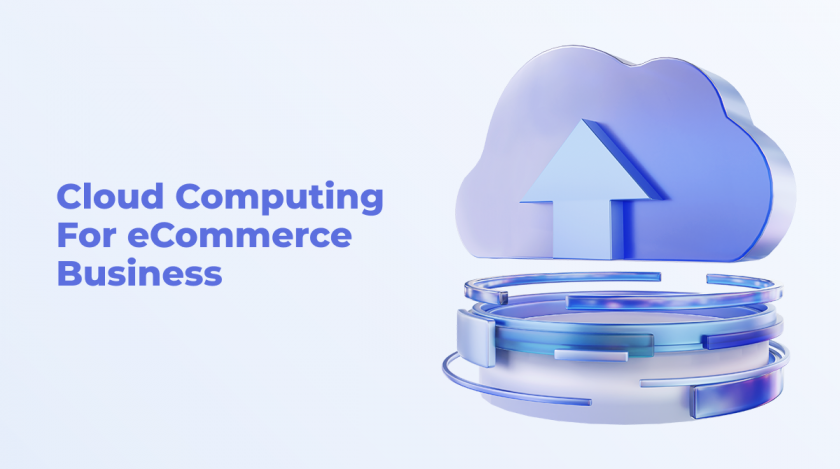If you’re an eCommerce merchant, you already have to deal with security, scalability, cost reduction, and many more vertices in the business. In easier terms, you scale fast, you fail fast, you adapt fast, you learn fast, and you earn fast.
The cloud computing does exactly the same if you own an eCommerce brand. Almost 70% of retail experts believed the cloud would take retail sectors like eCommerce by storm. The necessity for cloud computing has only grown since Covid-19.
But you may ask: how did it happen? This post will help you learn the essential benefits of cloud computing in eCommerce. We’ll start with the definition, and then the benefits eCommerce merchants get from adopting cloud computing infrastructure for their businesses.
So let’s begin with understanding what cloud computing in eCommerce is.
What is Cloud Computing for eCommerce Business?
Cloud computing in eCommerce refers to using cloud-based services and infrastructure to support and improve many areas of online retail operations. Instead of relying entirely on local servers or physical infrastructure, eCommerce enterprises use cloud service providers’ remote servers, networks, and software.
8 Reasons to Make Cloud Computing a Part of eCommerce
Some of the reasons to incorporate cloud computing in your eCommerce enterprise are as given below:
1. Scalability
eCommerce is a fast-paced, ever-changing sector. User needs for any online store can increase or decrease at any point in time. That’s why online enterprises must be prepared for such changes. Cloud computing provides the tools and resources to handle seamless shifts of domains in real-time.
The ability of a website or program to respond to seasonal spikes and shift patterns of use quickly is known as scalability. Most eCommerce stores see a traffic surge over the holidays, demanding the need for sufficient internet bandwidth.
Similarly, the website does not require as many resources when demand is low. Cloud computing enables these resources to alter in response to service demand.
2. Cost Reduction
The majority of cloud computing services operate on a subscription model. It implies you don’t have to make a large investment at once; instead, you pay a monthly or annual membership that too when you use the product.
With such pricing arrangements, businesses can save money on power, storage, and digital infrastructure. Another thing to consider is that cloud eCommerce also saves money on technological upgrades and upkeep.
For example, a corporation that purchases storage devices will almost certainly have to replace them in a few years due to technological improvements. However, the service provider has upgrades in cloud computing.
3. Data Protection
There are several advantages to cloud computing, including enhanced security measures to protect customer data. To keep data private even when accessed by unauthorized individuals, cloud storage systems use encryption technologies.
Cloud computing also enables access control, which reduces the danger of unauthorized workers accessing confidential information. Furthermore, many cloud service providers support identity management technology that can be used to detect suspicious activity on accounts or potential system flaws.
This makes it easier for online businesses to monitor network traffic and spot problems before they become serious.
4. Data Backups and Recovery
Cloud computing enables reliable data recovery and backup. Cloud services guarantee replication by copying and disseminating data in various data centers. This further helps prevent data loss from natural disasters, hardware failures, or other unforeseeable events.
Hence, in case of a system failure or disaster, eCommerce companies can swiftly recover their data from cloud backups and restart operations with minimal downtime.
Cloud-based disaster recovery solutions frequently deliver faster recovery times than traditional backup methods, reducing downtime and potential revenue loss. You can also opt for the air gap backup, which will help protect your data and lessen the risk of asset loss, company interruption, or reputational damage.
5. Speed
Speed is one of the most influential factors of eCommerce platforms. These platforms tend to slow down and become unresponsive in case of a sudden spike in user traffic.
Such scenarios have a bad effect on the user experience, deteriorating the image and brand value of the enterprise. In fact, 40% of users leave eCommerce stores if they load more than 3 seconds.
Fortunately, eCommerce hosted on cloud computing infrastructure doesn’t have speed issues. You can scale your speed bandwidth any time you feel the need. It is achieved with the help of consistent cloud services and data storage close to the user’s location.
6. Machine Learning and Artificial Intelligence
Machine learning and artificial learning technologies are part of cloud computing. It learns user behavior and gives personalized suggestions for your products.
Businesses can achieve more traction by targeting the correct clients with marketing efforts. Furthermore, this feature of cloud computing in eCommerce aids in the resolution of numerous challenges, such as inventory management, by predicting repeating sales patterns.
7. Flexibility and Agility
The way eCommerce businesses operate has been fundamentally transformed by cloud computing. Companies no longer need to invest in data centers, software, and hardware to store client data and access business applications.
Companies may now install services fast and efficiently on demand, giving them the flexibility and agility they need to thrive in the changing digital landscape.
In addition, compared to traditional hosting solutions, cloud computing delivers a dependable platform resistant to downtime or outages. Businesses can benefit from more rapid deployment times and ongoing scalability during peak demand periods or unexpected traffic spikes.
These features improve overall productivity and create improved user experiences that keep customers returning for more.
8. Reliability and Performance
Cloud computing enables eCommerce enterprises to expand their operations abroad rapidly. Cloud service providers have data centers and infrastructure in several geographical zones, allowing enterprises to cater to their clients in different regions effectively.
Moreover, by moving services closer to end users, this global reach minimizes latency, boosting website performance and response times.
The eCommerce businesses can also use content delivery networks (CDNs) to quickly distribute website content and media files to customers worldwide.
Conclusion
The benefits of cloud computing mentioned above are merely the tip of the iceberg. With the advancement of technology, eCommerce platforms will be able to avail a lot more benefits. So, if you own an eCommerce platform, especially enterprise-level commerce, it’s good to think in the commerce cloud direction.












